用介词短语来代替状语从句
- 格式:doc
- 大小:38.50 KB
- 文档页数:3
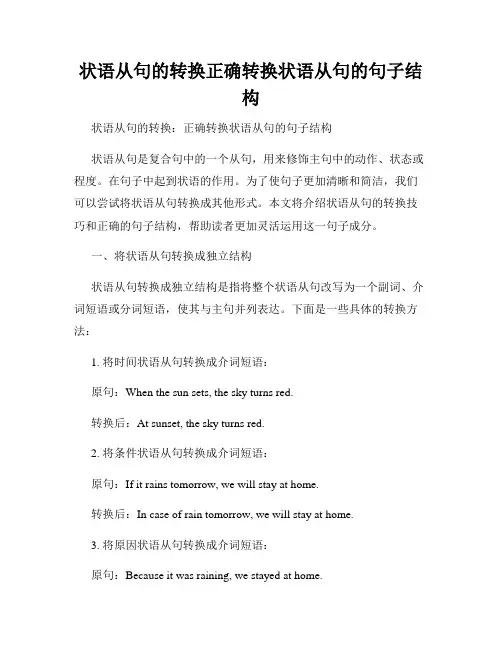
状语从句的转换正确转换状语从句的句子结构状语从句的转换:正确转换状语从句的句子结构状语从句是复合句中的一个从句,用来修饰主句中的动作、状态或程度。
在句子中起到状语的作用。
为了使句子更加清晰和简洁,我们可以尝试将状语从句转换成其他形式。
本文将介绍状语从句的转换技巧和正确的句子结构,帮助读者更加灵活运用这一句子成分。
一、将状语从句转换成独立结构状语从句转换成独立结构是指将整个状语从句改写为一个副词、介词短语或分词短语,使其与主句并列表达。
下面是一些具体的转换方法:1. 将时间状语从句转换成介词短语:原句:When the sun sets, the sky turns red.转换后:At sunset, the sky turns red.2. 将条件状语从句转换成介词短语:原句:If it rains tomorrow, we will stay at home.转换后:In case of rain tomorrow, we will stay at home.3. 将原因状语从句转换成介词短语:原句:Because it was raining, we stayed at home.转换后:Due to the rain, we stayed at home.4. 将目的状语从句转换成不定式短语:原句:I study hard so that I can pass the exam.转换后:I study hard to pass the exam.5. 将方式状语从句转换成独立结构:原句:She walked as if she were in pain.转换后:She walked with apparent pain.二、将状语从句转换成其他从句除了将状语从句转化为独立结构外,还可以将其转换成其他从句形式,如不完全倒装、倒装、强调等。
下面是一些具体的转换方法:1. 将时间状语从句转换成主从倒装:原句:While I was watching TV, the phone rang.转换后:Watching TV, the phone rang.2. 将原因状语从句转换成强调结构:原句:Since you insist, I will go with you.转换后:It is you who insist, so I will go with you.3. 将结果状语从句转换成强调结构:原句:So that everyone could hear, she spoke loudly.转换后:It was for everyone to hear that she spoke loudly.三、将状语从句转换成省略在一些情况下,我们可以直接省略状语从句中的一部分内容,从而简化句子结构。
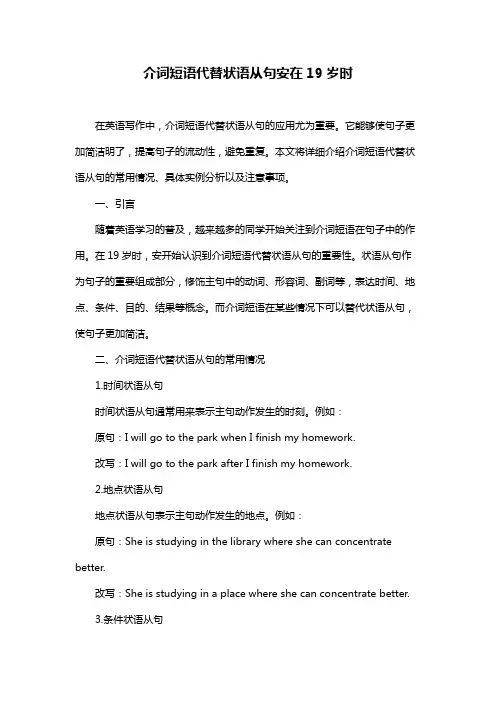
介词短语代替状语从句安在19岁时在英语写作中,介词短语代替状语从句的应用尤为重要。
它能够使句子更加简洁明了,提高句子的流动性,避免重复。
本文将详细介绍介词短语代替状语从句的常用情况、具体实例分析以及注意事项。
一、引言随着英语学习的普及,越来越多的同学开始关注到介词短语在句子中的作用。
在19岁时,安开始认识到介词短语代替状语从句的重要性。
状语从句作为句子的重要组成部分,修饰主句中的动词、形容词、副词等,表达时间、地点、条件、目的、结果等概念。
而介词短语在某些情况下可以替代状语从句,使句子更加简洁。
二、介词短语代替状语从句的常用情况1.时间状语从句时间状语从句通常用来表示主句动作发生的时刻。
例如:原句:I will go to the park when I finish my homework.改写:I will go to the park after I finish my homework.2.地点状语从句地点状语从句表示主句动作发生的地点。
例如:原句:She is studying in the library where she can concentrate better.改写:She is studying in a place where she can concentrate better.3.条件状语从句条件状语从句表示主句动作发生的条件。
例如:原句:If it doesn"t rain, we will have a picnic.改写:We will have a picnic provided that it doesn"t rain.4.目的状语从句目的状语从句表示主句动作的目的。
例如:原句:I bought a new computer to improve my work efficiency.改写:I bought a new computer so as to improve my work efficiency.5.结果状语从句结果状语从句表示主句动作产生的结果。
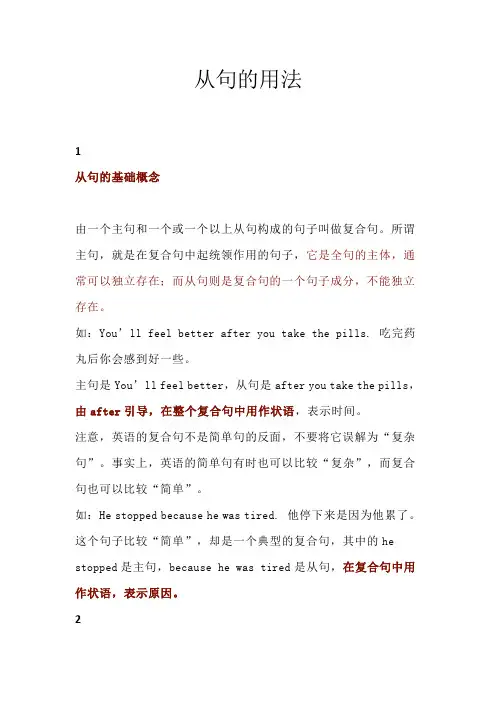
从句的用法1从句的基础概念由一个主句和一个或一个以上从句构成的句子叫做复合句。
所谓主句,就是在复合句中起统领作用的句子,它是全句的主体,通常可以独立存在;而从句则是复合句的一个句子成分,不能独立存在。
如:You’ll feel better after you take the pills. 吃完药丸后你会感到好一些。
主句是You’ll feel better,从句是after you take the pills,由after引导,在整个复合句中用作状语,表示时间。
注意,英语的复合句不是简单句的反面,不要将它误解为“复杂句”。
事实上,英语的简单句有时也可以比较“复杂”,而复合句也可以比较“简单”。
如:He stopped because he was tired. 他停下来是因为他累了。
这个句子比较“简单”,却是一个典型的复合句,其中的he stopped是主句,because he was tired是从句,在复合句中用作状语,表示原因。
2从句的分类一般说来,一个从句在复合句充当什么成分我们就叫它为什么从句——从句在复合句用作主语,我们就叫它为主语从句;从句在复合句用作宾语,我们就叫它为宾语从句等。
如:He answered that he knew nothing about it. 他回答说他不知情。
that 引导的从句在复合句中用作动词answered的宾语,因此为宾语从句。
The trouble is that I have lost his address. 麻烦的是我把他的地址丢了。
be动词后做表语从句He was rather pleased when he won that prize. 他获奖后相当高兴。
用状语表时间,也叫时间状语从句。
3名词性从句(主语从句、表语从句、宾语从句、同位语从句)主语从句、表语从句、宾语从句和同位语从句在复合句中的充当的成分和其名称相同,分别作主句的主语、表语、宾语和同位语。
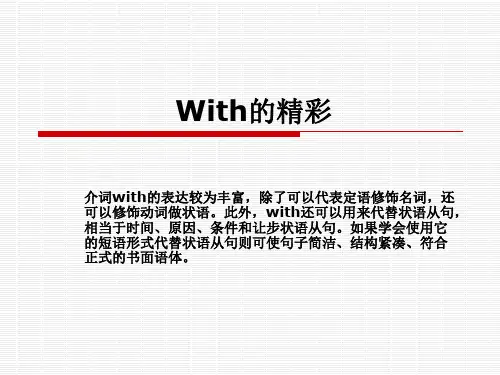
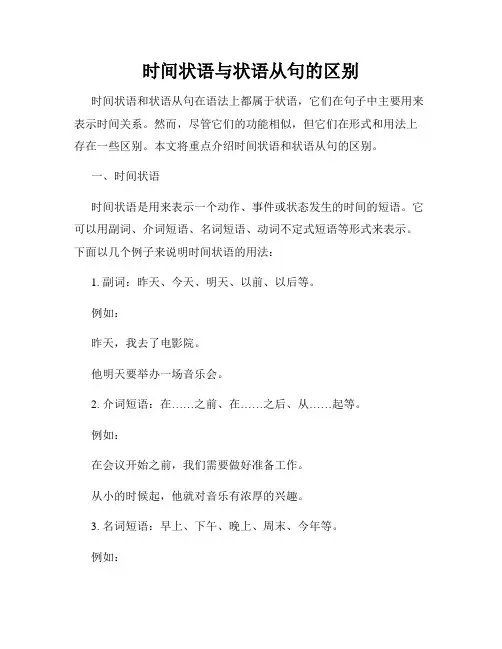
时间状语与状语从句的区别时间状语和状语从句在语法上都属于状语,它们在句子中主要用来表示时间关系。
然而,尽管它们的功能相似,但它们在形式和用法上存在一些区别。
本文将重点介绍时间状语和状语从句的区别。
一、时间状语时间状语是用来表示一个动作、事件或状态发生的时间的短语。
它可以用副词、介词短语、名词短语、动词不定式短语等形式来表示。
下面以几个例子来说明时间状语的用法:1. 副词:昨天、今天、明天、以前、以后等。
例如:昨天,我去了电影院。
他明天要举办一场音乐会。
2. 介词短语:在……之前、在……之后、从……起等。
例如:在会议开始之前,我们需要做好准备工作。
从小的时候起,他就对音乐有浓厚的兴趣。
3. 名词短语:早上、下午、晚上、周末、今年等。
例如:早上,我会去健身房锻炼。
他今年已经去了好几个国家旅行。
二、状语从句状语从句是由一个连词引导的句子,表示一个动作、事件或状态发生的时间,它和主句之间是一种从属关系。
常见的时间状语从句引导词有:when、while、before、after、since、until等。
下面以几个例子来说明状语从句的用法:1. 引导词when:当……时候、在……时间等。
例如:当我看到她的时候,她正在做作业。
在我吃早饭的时候,她已经离开了。
2. 引导词while:在……期间、当……的时候等。
例如:我喜欢听音乐,而他则喜欢看电视。
当我在打扫房间的时候,他正在做饭。
3. 引导词before和after:在……之前、在……之后等。
例如:在他来之前,我已经离开了。
她已经吃完晚饭后,才开始看电视。
三、时间状语与状语从句的区别时间状语和状语从句在形式和用法上存在一些区别。
1. 形式上的区别:时间状语通常是一个短语或者一个词,例如副词、介词短语、名词短语等。
而状语从句是一个完整的句子,由一个引导词和一个主句构成。
2. 位置上的区别:时间状语可以出现在句子的任何位置,可以放在句首、句中或句末。
而状语从句通常放在主句之后,或者主句的中间。
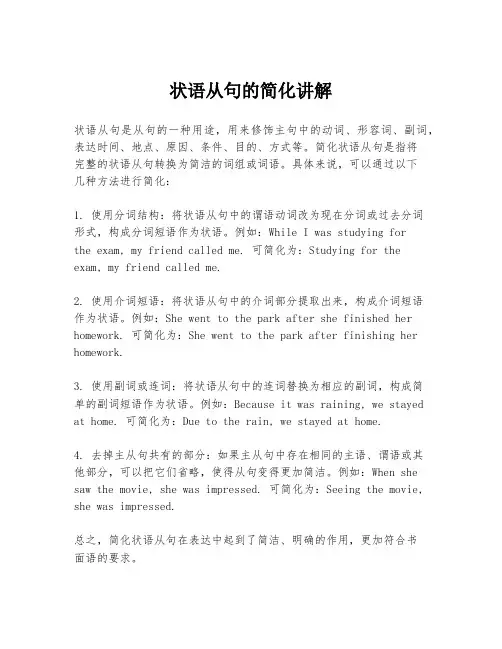
状语从句的简化讲解状语从句是从句的一种用途,用来修饰主句中的动词、形容词、副词,表达时间、地点、原因、条件、目的、方式等。
简化状语从句是指将完整的状语从句转换为简洁的词组或词语。
具体来说,可以通过以下几种方法进行简化:1. 使用分词结构:将状语从句中的谓语动词改为现在分词或过去分词形式,构成分词短语作为状语。
例如:While I was studying forthe exam, my friend called me. 可简化为:Studying for the exam, my friend called me.2. 使用介词短语:将状语从句中的介词部分提取出来,构成介词短语作为状语。
例如:She went to the park after she finished her homework. 可简化为:She went to the park after finishing her homework.3. 使用副词或连词:将状语从句中的连词替换为相应的副词,构成简单的副词短语作为状语。
例如:Because it was raining, we stayed at home. 可简化为:Due to the rain, we stayed at home.4. 去掉主从句共有的部分:如果主从句中存在相同的主语、谓语或其他部分,可以把它们省略,使得从句变得更加简洁。
例如:When she saw the movie, she was impressed. 可简化为:Seeing the movie, she was impressed.总之,简化状语从句在表达中起到了简洁、明确的作用,更加符合书面语的要求。
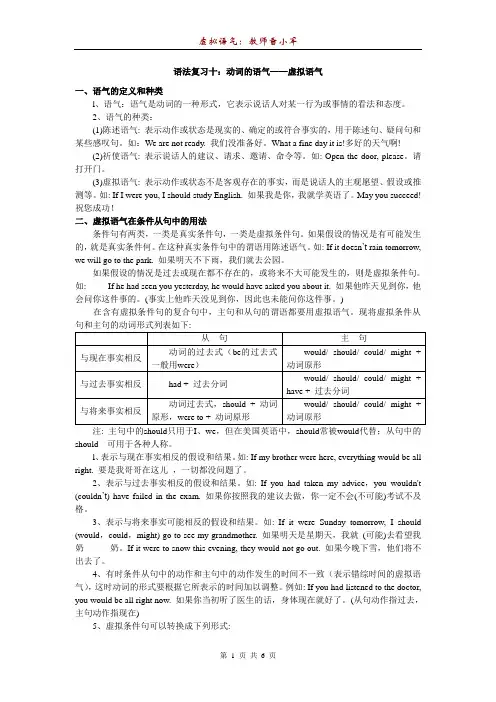
语法复习十:动词的语气——虚拟语气一、语气的定义和种类l、语气:语气是动词的一种形式,它表示说话人对某一行为或事情的看法和态度。
2、语气的种类:(1)陈述语气: 表示动作或状态是现实的、确定的或符合事实的,用于陈述句、疑问句和某些感叹句。
如:We are not ready. 我们没准备好。
What a fine day it is!多好的天气啊!(2)祈使语气: 表示说话人的建议、请求、邀请、命令等。
如: Open the door, please。
请打开门。
(3)虚拟语气: 表示动作或状态不是客观存在的事实,而是说话人的主观愿望、假设或推测等。
如: If I were you, I should study English. 如果我是你,我就学英语了。
May you succeed! 祝您成功!二、虚拟语气在条件从句中的用法条件句有两类,一类是真实条件句,一类是虚拟条件句。
如果假设的情况是有可能发生的,就是真实条件何。
在这种真实条件句中的谓语用陈述语气。
如: If it doesn’t rain tomorrow, we will go to the park. 如果明天不下雨,我们就去公园。
如果假设的情况是过去或现在都不存在的,或将来不大可能发生的,则是虚拟条件句。
如: If he had seen you yesterday, he would have asked you about it. 如果他昨天见到你,他会问你这件事的。
(事实上他昨天没见到你,因此也未能问你这件事。
)在含有虚拟条件句的复合句中,主句和从句的谓语都要用虚拟语气。
现将虚拟条件从should 可用于各种人称。
l、表示与现在事实相反的假设和结果。
如: If my brother were here, everything would be all right. 要是我哥哥在这儿,一切都没问题了。
2、表示与过去事实相反的假设和结果。
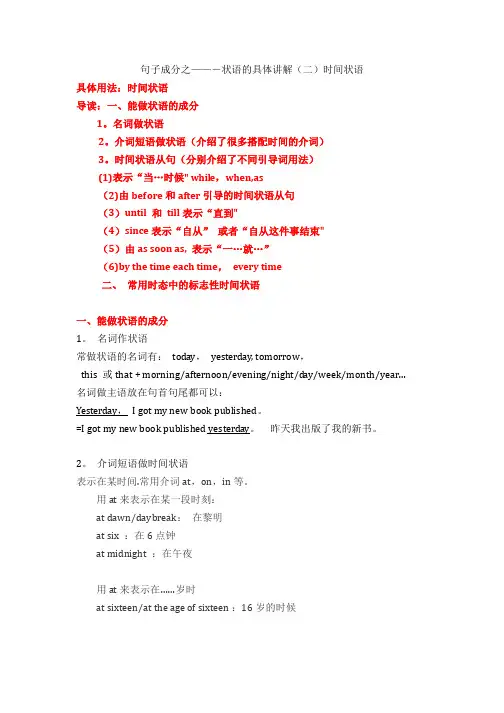
句子成分之——-状语的具体讲解(二)时间状语具体用法:时间状语导读:一、能做状语的成分1。
名词做状语2。
介词短语做状语(介绍了很多搭配时间的介词)3。
时间状语从句(分别介绍了不同引导词用法)(1)表示“当…时候" while,when,as(2)由before和after引导的时间状语从句(3)until 和till表示“直到"(4)since表示“自从”或者“自从这件事结束"(5)由as soon as, 表示“一…就…”(6)by the time each time,every time二、常用时态中的标志性时间状语一、能做状语的成分1。
名词作状语常做状语的名词有:today,yesterday, tomorrow,this 或that + morning/afternoon/evening/night/day/week/month/year…名词做主语放在句首句尾都可以:Yesterday,I got my new book published。
=I got my new book published yesterday。
昨天我出版了我的新书。
2。
介词短语做时间状语表示在某时间.常用介词at,on,in等。
用 at 来表示在某一段时刻:at dawn/daybreak:在黎明at six :在6点钟at midnight :在午夜用 at 来表示在……岁时at sixteen/at the age of sixteen :16岁的时候用 on 来表示在星期几/某日on Monday :在星期一on January fifth:在1月5日on Christmas Day :在圣诞节那一天也可用at Christmason New Year’s Day:在新年那天用in来表示一天中的早中晚,月份,季节或年份in the morning/afternoon/evening在早晨,下午,晚上in January/ February在一月,二月in Spring在春天in 2014在2014年表示期间常用介词during,for,over,within,throughout,from和to等。
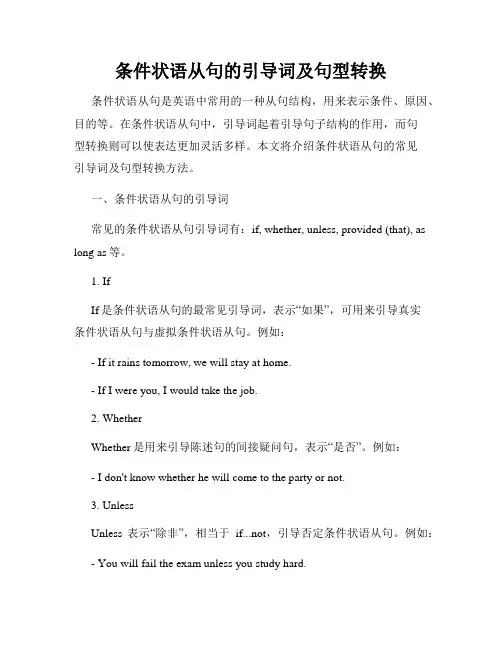
条件状语从句的引导词及句型转换条件状语从句是英语中常用的一种从句结构,用来表示条件、原因、目的等。
在条件状语从句中,引导词起着引导句子结构的作用,而句型转换则可以使表达更加灵活多样。
本文将介绍条件状语从句的常见引导词及句型转换方法。
一、条件状语从句的引导词常见的条件状语从句引导词有:if, whether, unless, provided (that), as long as等。
1. IfIf是条件状语从句的最常见引导词,表示“如果”,可用来引导真实条件状语从句与虚拟条件状语从句。
例如:- If it rains tomorrow, we will stay at home.- If I were you, I would take the job.2. WhetherWhether是用来引导陈述句的间接疑问句,表示“是否”。
例如:- I don't know whether he will come to the party or not.3. UnlessUnless表示“除非”,相当于if...not,引导否定条件状语从句。
例如:- You will fail the exam unless you study hard.4. Provided (that)Provided (that)表示“只要”,相当于as long as。
例如:- You can go out to play provided (that) you finish your homework.二、条件状语从句的句型转换条件状语从句可以通过句型转换来增加语言表达的多样性。
1. 将条件状语从句改为条件状语从句的省略句当主句与条件从句的主语和谓语相同时,可以将从句中的主语和be 动词省略。
例如:- If you come late, you will miss the train.变为:Come late, you will miss the train.2. 将条件状语从句改为条件状语从句的倒装句当主句与条件从句中的某些状语或状语修饰语倒装时,可以将条件从句改为倒装句。
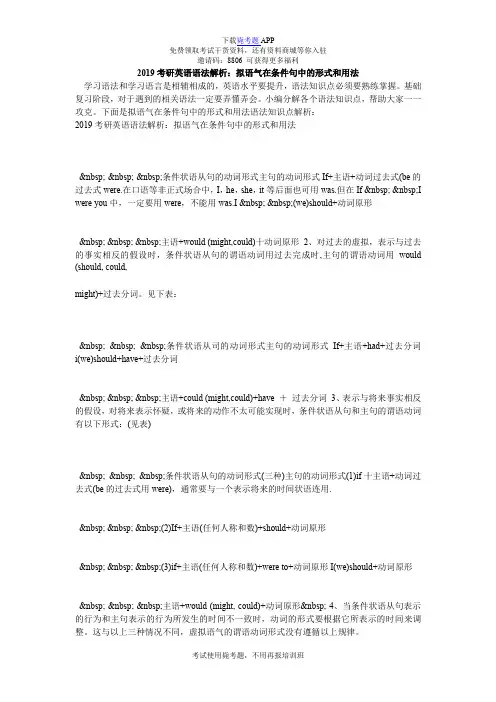
2019考研英语语法解析:拟语气在条件句中的形式和用法学习语法和学习语言是相辅相成的,英语水平要提升,语法知识点必须要熟练掌握。
基础复习阶段,对于遇到的相关语法一定要弄懂弄会。
小编分解各个语法知识点,帮助大家一一攻克。
下面是拟语气在条件句中的形式和用法语法知识点解析:2019考研英语语法解析:拟语气在条件句中的形式和用法 条件状语从句的动词形式主句的动词形式If+主语+动词过去式(be的过去式were.在口语等非正式场合中,I,he,she,it等后面也可用was.但在If I were you中,一定要用were,不能用was.I (we)should+动词原形 主语+would (might,could)十动词原形2、对过去的虚拟,表示与过去的事实相反的假设时,条件状语从句的谓语动词用过去完成时,主句的谓语动词用would (should, could,might)+过去分词。
见下表: 条件状语从司的动词形式主句的动词形式If+主语+had+过去分词i(we)should+have+过去分词 主语+could (might,could)+have +过去分词3、表示与将来事实相反的假设,对将来表示怀疑,或将来的动作不太可能实现时,条件状语从句和主句的谓语动词有以下形式:(见表) 条件状语从句的动词形式(三种)主句的动词形式(1)if十主语+动词过去式(be的过去式用were),通常要与一个表示将来的时间状语连用. (2)If+主语(任何人称和数)+should+动词原形 (3)if+主语(任何人称和数)+were to+动词原形I(we)should+动词原形 主语+would (might, could)+动词原形 4、当条件状语从句表示的行为和主句表示的行为所发生的时间不一致时,动词的形式要根据它所表示的时间来调整。

原题目: 状语从句与非谓语动词的转化(写作)在写作中,状语从句和非谓语动词都是常用的语法结构。
它们可以用来表达时间、原因、条件、目的等不同的含义。
本文将对状语从句和非谓语动词的使用进行比较,并提供一些转化的方法。
一、状语从句的转化状语从句在句子中作为状语,通常由连词引导。
为了使句子更加简洁明了,我们可以将状语从句转化为其他形式。
1. 将状语从句转化为分词短语例如:- 状语从句:因为我迟到了,所以老师生气了。
- 分词短语:迟到了,老师生气了。
2. 将状语从句转化为不定式短语例如:- 状语从句:虽然天气很冷,但他还是出去了跑步。
- 不定式短语:天气很冷,他还是出去了跑步。
3. 将状语从句转化为介词短语例如:- 状语从句:当他听到好消息时,他高兴得跳了起来。
- 介词短语:听到好消息时,他高兴得跳了起来。
二、非谓语动词的转化非谓语动词是动词的一种形式,可以作主语、宾语、定语或状语。
在写作中,我们可以将非谓语动词转化为其他形式,以减少句子的复杂性。
1. 将非谓语动词转化为动词-ing形式例如:- 非谓语动词:我喜欢读书。
- 动词-ing形式:我喜欢阅读。
2. 将非谓语动词转化为动词不定式例如:- 非谓语动词:他跟我一起完成了任务。
- 动词不定式:他和我一起完成任务。
3. 将非谓语动词转化为名词例如:- 非谓语动词:她喜欢游泳。
- 名词:她喜欢游泳。
总结:通过将状语从句和非谓语动词进行转化,可以使句子更加简洁明了。
在实际写作中,我们可以根据需要选择合适的转化形式。
然而,需要注意的是,转化时要注意保持句子的逻辑完整性和语法准确性。
以上是关于状语从句与非谓语动词的转化的简介,希望能对您有所帮助。
Unit 4 Life on Mars课时3 Grammar简单句与从句的转化1. 简单句与状语从句的转化。
【精讲】用介词短语把状语从句转换为简单句①由when,before,after 等引导的时间状语从句,可以用相应的介词短语来代替。
例:Neil Armstrong received his student pilot's licence when he was 16.→Neil Armstrong received his student pilot's licence at the age of 16.①由if,unless 引导的条件状语从句,可以用由without 构成的介词短语来代替。
例:Humans cannot survive if there is no food, water or oxygen.→Humans cannot survive without food, water or oxygen.①由because 引导的原因状语从句,可以用由because of 构成的介词短语来代替。
例:People might float in space because the gravity is low. →People might float in space because of the low gravity.①由(as...) as 引导的比较状语从句,有时可以用“be of the same+名词”结构来代替。
例:Lily is as old as Lucy.→Lily and Lucy are of the same age.莉莉和露西年龄一样大。
【随学随练】将下列句子改为简单句。
1.We’ll play football when school is over.2.You must wash your hands before you have meals.3.People can’t live if there is no air or water.重点词汇1. * adj.知道,意识到2. vt&vi.围绕......圈起来3. n.一致同意4.* n.距离,远处5. n.可能性6.* n.外星人7. n.外来者,陌生人重点词组1.努力了解更多关于火星2.拥有与地球上一样的环境3.在背上背氧气罐4.通过建造室内操场来解决5.顺便说一下重点句型 1. 在一个拥有比地球更轻薄的空气的星球上很难呼吸。
用介词短语来代替状语从句1.While it is being compacted, considerable lateral横(向)的pressureis exerted by concrete.2.If pressure is constant, gases will expand when heated.3.If values of W are small, the impedance of the capacitor is largerelative to R.4.When temperatures are greater than 60℃,this equation does notapply.5.While it is being compacted, considerable lateral pressure isexerted by concrete.•During compacting/compactification,(a) considerable lateral pressure is exerted by the concrete.•At/For/With constant pressure, gases will expand when heated.•For/With small values of ω,the impedance of the capacitor is large relative to R.•At/With temperatures greater than 60oC, this equation does not apply.名词短语代替状语从句6.If the diode is analyzed physically, it can be shown that7.In this case electrons will possess more energy, so that thebrightness of the spot can be increased.A physical analysis of the diode shows that•In this case electrons will possess more energy, thus increasing the brightness of the spot.1.Some water which has been distilled some distilled water2.A bridge which has been incorrectly designed an incorrectlydesigned bridge3.The substances which are not known the unknown substances4.A problem which has still not been solved an unsolved problem5.Satellites which are made by man man-made satellites6.Signals which are modulated in amplitude振幅amplitude-modulatedsignals7.Steel which is plated with chromium铬chromium-plated steel8.Pumps which are driven by wind wind-driven pumps9.The instruments which are used the instruments used10.The number of mistakes which have been found the number ofmistakes found11.The new cars which a used for racing the new racing cars12.Paper which is used for drawing drawing paper13.Bodies which fall freely freely falling bodies14.A country which produces oil an oil-producing country15.The point at which it boils the boiling point16.Material is tested in this way material so/thus tested17.Paper which has blue lines blue-lined paper18.A saw which has wide teeth a wide-toothed saw19.A triangle which has acute angles an acute-angled triangle将下面句子翻译虚拟语气若没有半导体(semiconductor),卫星通讯(satellite communications)就不可能了。
状语从句的省略与替代技巧状语从句作为复合句中的一个重要成分,用以修饰主句中的动词、形容词、副词等,起到补充说明、限定条件、表示目的或原因等作用。
在书写状语从句时,我们可以灵活运用省略与替代技巧,以增加文章的流程和准确性。
一、省略技巧在某些情况下,可以省略状语从句中的主语、谓语或其他成分,以简化句子结构,使文章更加简洁明了。
1. 省略主语在表达状语从句时,如果主句与从句的主语一致,可以省略从句中的主语。
例1:原句:当我看到这本书的时候,我决定购买。
省略后:当看到这本书的时候,我决定购买。
2. 省略谓语如果主句与从句的谓语相同,可以省略从句中的谓语。
例2:原句:他昨天告诉我,他要去北京旅行。
省略后:他昨天告诉我要去北京旅行。
3. 省略其他成分在状语从句中,有时也可以省略其他成分,如省略关系副词“where”、“why”等。
例3:原句:我喜欢在家里读书,因为那里安静。
省略后:我喜欢在家里读书,因为安静。
二、替代技巧除了省略状语从句中的某些成分,我们还可以通过替代词语的方式来改写状语从句,以增加文章的多样性和层次感。
1. 用介词短语替代地点状语从句例4:原句:他工作的地方很远,所以经常迟到。
替代后:由于他工作地方很远,所以经常迟到。
2. 用形容词或副词替代方式状语从句例5:原句:他用努力的方式学习,以便取得好成绩。
替代后:他努力地学习,以便取得好成绩。
3. 用短语或不定式替代目的状语从句例6:原句:她努力学习,为了考上理想的大学。
替代后:她努力学习,以实现考上理想大学的目标。
通过上述的省略与替代技巧,我们能够让句子更加简洁、流畅,并突出主要信息。
当然,在运用这些技巧时,我们需要根据具体语境来进行判断,确保句子表达准确清晰。
总结起来,状语从句在文章中具有重要的修饰作用,通过灵活运用省略与替代技巧,我们可以增加文章的流程,使句子更加简洁明了。
希望本文介绍的状语从句的省略与替代技巧能够为您的写作提供帮助。
介词短语与状语从句的转换介词短语和状语从句是英语语法中常见的句子成分,它们分别用于修饰动词、形容词、副词等。
在表达方式上,介词短语和状语从句有时可以互相转换,达到语句变换和表达方式变化的效果。
本文将探讨介词短语和状语从句之间的转换,并提供实例以帮助理解。
一、介词短语与状语从句的定义与特点介词短语是由介词和其后的名词短语组成的结构,一般用来修饰名词或动词。
例如,“on the table”(在桌子上)中的介词短语修饰了名词“table”。
状语从句是由连接词引导的从句,一般用来修饰动词、形容词、副词等。
例如,“when I was young”(当我年轻的时候)中的状语从句修饰了动词“was”。
介词短语与状语从句的相同点是它们都可以用来修饰句子中的其他成分,但在结构和表达方式上有所不同。
二、介词短语与状语从句的转换1. 时间状语转换:介词短语:on Monday(在星期一)状语从句:when I was a child(当我还是个孩子的时候)例如:介词短语:I will meet him on Monday.(星期一我将见他。
)状语从句:I will meet him when I was a child.(当我还是个孩子的时候我将见他。
)2. 地点状语转换:介词短语:at the supermarket(在超市)状语从句:where I bought some groceries(在那我买了一些杂货)例如:介词短语:I met her at the supermarket.(我在超市遇见了她。
)状语从句:I met her where I bought some groceries.(我在买杂货的地方遇见了她。
)3. 原因状语转换:介词短语:due to bad weather(由于恶劣天气)状语从句:because of the bad weather(因为天气不好)例如:介词短语:The flight was delayed due to bad weather.(航班因恶劣天气延误。
用介词短语来代替状语从句
1.While it is being compacted, considerable lateral横(向)的pressure
is exerted by concrete.
2.If pressure is constant, gases will expand when heated.
3.If values of W are small, the impedance of the capacitor is large
relative to R.
4.When temperatures are greater than 60℃,this equation does not
apply.
5.While it is being compacted, considerable lateral pressure is
exerted by concrete.
•During compacting/compactification,(a) considerable lateral pressure is exerted by the concrete.
•At/For/With constant pressure, gases will expand when heated.•For/With small values of ω,the impedance of the capacitor is large relative to R.
•At/With temperatures greater than 60oC, this equation does not apply.
名词短语代替状语从句
6.If the diode is analyzed physically, it can be shown that
7.In this case electrons will possess more energy, so that the
brightness of the spot can be increased.
A physical analysis of the diode shows that
•In this case electrons will possess more energy, thus increasing the brightness of the spot.
1.Some water which has been distilled some distilled water
2.A bridge which has been incorrectly designed an incorrectly
designed bridge
3.The substances which are not known the unknown substances
4.A problem which has still not been solved an unsolved problem
5.Satellites which are made by man man-made satellites
6.Signals which are modulated in amplitude振幅amplitude-modulated
signals
7.Steel which is plated with chromium铬chromium-plated steel
8.Pumps which are driven by wind wind-driven pumps
9.The instruments which are used the instruments used
10.The number of mistakes which have been found the number of
mistakes found
11.The new cars which a used for racing the new racing cars
12.Paper which is used for drawing drawing paper
13.Bodies which fall freely freely falling bodies
14.A country which produces oil an oil-producing country
15.The point at which it boils the boiling point
16.Material is tested in this way material so/thus tested
17.Paper which has blue lines blue-lined paper
18.A saw which has wide teeth a wide-toothed saw
19.A triangle which has acute angles an acute-angled triangle
将下面句子翻译虚拟语气
若没有半导体(semiconductor),卫星通讯(satellite communications)就不可能了。
②我们本来也可以用定理(theorem)(6)来导出(derive)式(5)
③一旦出现什么情况,尽快让我们知道。
④数字(digital)设计人员(designer)很好地了解布尔代数(Boolean algebra)是十分必
要的。
⑤有人建议在太空制造药物(drug).
⑥这来自于输出要稳定(stable)这一需要(necessity)。
⑦其条件是(x-a)为一个根(root)。
⑧这根传输线(transmission line)的作用好像它是开路(open-circuit)似的。
⑨我们周围的一切东西,无论是空气、水还是木头(wood),都是物质
1 Without semiconductors, satellite communications would be impossible.
2 We could also have used Theorem (6) to derive Eq. (5).
3 Should anything happen, let us know as soon as possible.
4 It is quite essential that digital designers (should) have a good knowledge of Boolean algebra.
5 It is suggested that drugs be made in space.
6 This comes from the necessity that the output be stable.
7 Its condition is that (x–a) be a root.
8 This transmission line acts as if it were open-circuit.
9 Everything around us, be it air, water or wood, is matter.
名词化结构主语
1.If the thickness of the lagging(绝热材料)is increased, it will
reduce the heat losses.
2.If machines are tested by this method, there will be some loss of
power.
3.If the temperature rises by 50℃, it would result in a in Zener
voltage of 3.75%.
4.If these listings are studied , it will greatly help the programmer
in finding any errors made in writing the program.
5.If the diode(二极管)is physically analyzed, it will be shown that
the current and voltage are related by the following equation •An increase in the thickness of the lagging will reduce the heat losses.
•The testing of machines by this method will entail/result in some loss of power.
• A temperature rise of 50oC [OR: A rise in/of temperature by 50oC] would result in a change in Zener voltage of 3.75%.
• A study of these listings will greatly help the programmer in
finding any errors made in writing the program.
• A physical analysis of the diode shows that the current and voltage are related by the following equation.。